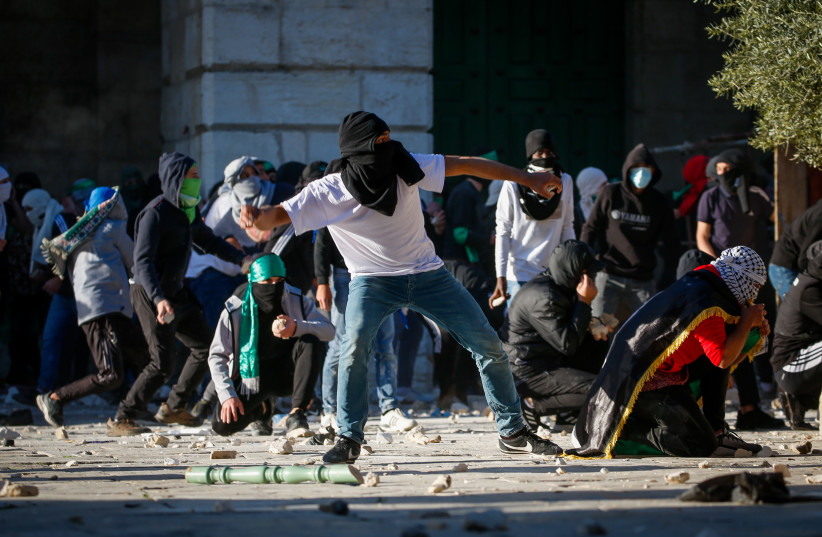Jerusalem, declared Sir Mark Sykes, is “inflammable ground,” The New York Times reported on December 12, 1917. Sykes, of Cairo Arab Bureau fame, had spoken in Manchester three days earlier at a Zionist assembly called to thank Britain’s government for the Balfour Declaration. Sykes noted that the city “throbbed with history” and that “a careless word or gesture might set half a continent aflame.”
Sykes further explained that Jerusalem called for more than “diplomacy, tact, virtue, or the delicacy of the drawing-room politician,” even more than “toleration.” What was required was “sympathy, understanding, and sacrifice.” For whom was that “sympathy”? It was “to the Muslim for whom the Mosque of Omar is the most sacred spot on earth.”
This might have been the first time a warning that the Temple Mount possesses the most incendiary potential was sounded. It also contained, incidentally, all the misrepresentation, historical and religious, that the matter has come to assume in today’s politics, providing the Arabs, gratis, with all the combustible material they need.
No match needs to be lit; just a hint of a threat is enough. Sykes had fashioned a political myth.

CHAIM WEIZMANN, who was present at that Manchester rally, learned very quickly what Sykes meant. In April 1918, Weizmann needed to visit the Sultan of Egypt to dispel rumors that the Zionists had received British permission to destroy the Mosque of Omar and rebuild the Temple. In 1922, High Commissioner Herbert Samuel had to deny rumors that Muslim possession of the Haram A-Sharif was threatened. But the myth had been implanted and became quite a potent tool.
During 1922-1924, the Mufti Amin Al-Husseini dispatched a delegation to tour Muslim countries that churned out those rumors from Saudi Arabia to India and beyond. He nurtured the myth and politicized it.
Ever since, non-Muslims have been prohibited from entering the sacred compound. Following the signing of the 1229 Treaty of Jaffa until the mid-19th century, the exclusiveness of the site was accepted by all. That treaty assured that the Temple Mount area would remain under the control of the Muslim religious authorities. It created another myth, one at the foundation of today’s “status quo.” That myth-cum-policy subjected Jews to a discriminatory denial of their national and religious rights.
During the early Mandate period, the Supreme Muslim Council enlarged the myth and worked to delegitimize not only the rights of Jews to the Western Wall but at the Wall also. Following the mechitza (partition separating men and women) removal incident of 1928, Al-Husseini began his “Defend Al-Buraq” campaign, claiming Jews wanted to take over the Haram compound.
Buraq was the name of a mythical flying creature that transported the Prophet Muhammad to Jerusalem and was tied near the Wall. This myth supplied an Islamic sanctity to the Western Wall courtyard, which the Mufti managed to convince the British was superior to the Jewish claim to the Wall.
No matter how much the official Jewish institutions denied the assertion, it was to no avail. Following the murderous August 1929 riots that the Mufti instigated, the decision of the International Commission appointed by the British was that the sole ownership of the Western Wall belongs to the Muslims, including the pavement in front of it; it’s all Waqf property, even if outside the Haram.
Setting a pattern
THE PATTERN had thus been set. First, establish an unassailable right or presumed privilege, one that dares not be challenged or considered inauthentic. Second, assert that any Jewish competing claim is invalid. Third, in a menacing fashion, contend that the Jews are actively involved in acting to undermine and harm Muslim interests. Fourth, express aggression, in words and in deeds, in an assumed righteous anger, while blaming the Jews and browbeating any supporting opposition. That’s how their myths were constructed.
In post-1967 Israel, that policy was applied with great success, first by Yasser Arafat on behalf of the “Palestinian” people and then by Northern Islamic head Sheikh Raed Salah and others, with assistance from Arab MKs and their extreme-left Jewish colleagues.
The history of a Jewish Jerusalem was denied. The entrance of Jews, even in a most restricted manner, to the Haram precincts was termed “storming.” And the Ramadan month became sacrosanct in a most scurrilous way.
Riots at the Temple Mount became regular and led to terror attacks. The Haram compound became a site of rallies and the chanting of nationalist slogans while the flags and pennants of various terror groups were unfurled. A march of Jews was an excuse to fire rockets from Gaza at the city. All the while, Israel’s security services adopted the cowering position of blaming and punishing Jews for Arab aggression. Their slogan was, “The situation is explosive.”
According to Muslim tradition, as the MEMRI site explains, during Ramadan, Allah grants the Muslims glorious victories. The great battles of Islam, from Badr in 624 and the conquest of Mecca in 630 to the October 6, 1973, “War of Ramadan” fought by Egypt against Israel, all occurred during Ramadan. In recent years, there have been numerous terrorist attacks in Israel during Ramadan.
In their sermons, prominent Islamic religious leaders stress that Ramadan is the month of jihad, conquest, and victory in Islam. This outlook is also found in books for schoolchildren. The result is a Jewish media clamoring for Jewish surrender to Muslim sensibilities.
IS THERE another approach?
One recent example occurred in Saudi Arabia. There, after a woman raised the flag of Palestine at the Ka’aba in Mecca, Sheikh Abdul Rahman Al-Sudais, one of the imams of the Grand Mosque, stressed that the holy site is a place of worship where only religious slogans and chants should be heard. I would suggest that the Temple Mount is also not the place to unfurl Hamas banners.
Whatever action is proposed to counter Islamic violence, let us dispel another myth. Ramadan violence is not the fault of the Jews.
The writer is a researcher, analyst, and opinion commentator on political, cultural, and media issues.
